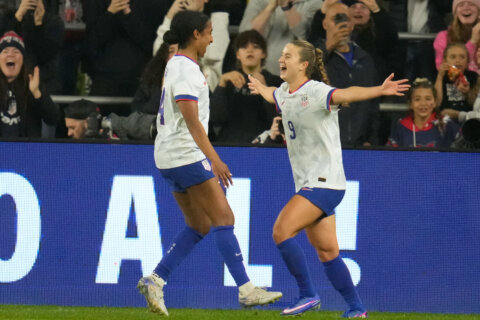WASHINGTON — Imagine a month of Super Bowls, 31 days of the NBA Finals or a 64-game World Series. That’s what the World Cup is for a lot of people. That’s what it feels like to me.
Don’t expect my full attention between June 14 and July 15. What could really be more important than watching Argentina and Croatia go at it? And don’t try and tell me I can skip Morocco vs. Iran. I won’t get another chance (really, another excuse) to watch this much soccer until 2022.
This obsession goes back to the Korea-Japan World Cup in 2002. Sure I was only 9, but that didn’t keep me from seeing Ronaldo take Oliver Kahn to school with the craziest haircut soccer has ever seen. From that year on, most of my summers have been filled with the grace of World Cups, Copa America and Euros.
And because I grew into soccer just as I was growing as a person, I never put much thought into how the events related to world issues. “Politics and sports don’t mix” is a rule I’d heard from commentators and read in all the papers.
But as an adult, I just can’t ignore how closely sports and politics are intertwined, especially when it comes to FIFA events. In 2004, Greece held the European Cup just a decade before their massive economic crisis. In 2007, Venezuela held the Copa America just as Hugo Chávez turned the country’s democracy into an effective dictatorship. And Brazil’s 2014 World Cup came just a year before the country started the process to impeach President Dilma Rousseff.
It’s not like FIFA has tried to make things any better: This year’s World Cup will be held in Russia, a country not only working to undermine democracies across the world, but a leader in human rights violations.
But what about the 2022 World Cup? Well, that one went to Qatar, a country using the blood of Nepalese workers, whose conditions are closer to slavery, to build their stadiums. And FIFA spared no expenses to accommodate the bid, including moving the schedule of soccer leagues all across the world so the tournament can be played in November.
Unsurprisingly, major corruption scandals have followed the past World Cup elections, tainting FIFA and its former president, Sepp Blatter, whose “bringing football to the whole world” promise proved just a crafty lie. And Blatter didn’t fall without putting up a fight: It took FBI investigations, scandalous arrests in Switzerland, double agents and more to ultimately turn football’s biggest institution into also the most untrusted across the world.
I know that this isn’t the teams’ fault, or the players’. But in between the games — when the news turns to the violence caused by Russian hooligans, or the assaults on LGBTQ rights during the event, both of which are sure to happen — is that blamelessness enough?
Soccer fans (or any fans, really) go to great lengths to isolate their passion from anything else. But should that include core values such as the belief in peace, democracy and liberty?
After the 2014 Winter Olympics in Sochi, Russia, Vladimir Putin’s government began the bloody and messy annexation of Crimea, and many fear the aggressive behavior may repeat after this World Cup. Once Putin has used football’s crown jewel as a smoke screen for more brutality worldwide, can the world of football honestly tell itself that it played no role, that “sports and politics don’t mix”?
I’m not sure I can.
Sure, I will watch this World Cup, and you can bet I’ll be watching in 2022, and if I’m lucky enough, I’ll be able to go to a game or two in 2026, when the World Cup will be held in the United States, Mexico and Canada. But I will also search for ways to clean up my favorite sport, to help those whose lives are critically impacted by FIFA’s inexcusable ways, and to make sure that the World Cup’s news coverage also includes the social issues in the host country, whichever it may be.






